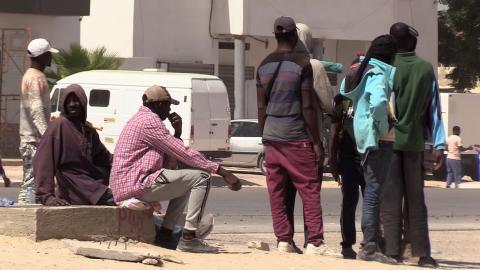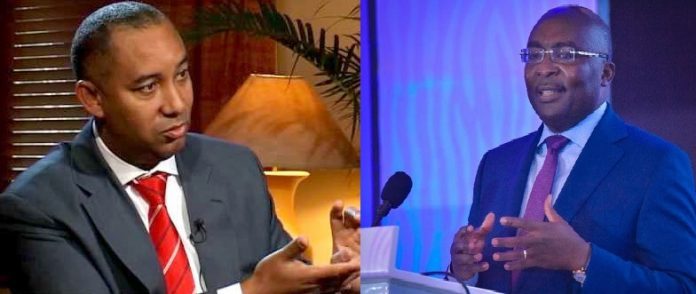Alex K. Mould (left, financial analyst) and Dr Alhaji Mahmoud Bawumia (right, Vice President of Ghana)
Financial industry experts have alarmed of imminent cleanup exercise as the country is witnessed a debt restructuring program.
This comes as the local economy is yet to recover from the first ever financial sector cleanup exercise initiated in 2019.
The experts explained that, Debt Exchange Program the debt-ridden country is to undertake will usher Ghanaians into unprecedented hardship likened to the era of 1979-83 hardship in Ghana. A former Executive Director at Standard Chartered has indicated that, the debt restructuring will result in sequence of events that will end with many borrowers defaulting their loans or funds borrowed. This will affect many financial institutions.
“Many will be borrowing funds which they won’t be paying back (so let us say they will be given grants, but lenders don’t know this yet)”, Alex Mould intuited in an interview last week.
“He itemised the expected economic situations due to the debt restructuring program as that: in this year, there will be less spending power, little or no savings; companies will borrow less and less production due to less demand (only essentials like food staples); Many businesses will fold and eventually lay off workers; Most contracts will not be honored; and Many rentals will be unoccupied. This will lead to low Gross Domestic Product (GDP) growth.”
To this, the Dean of University of Cape Coast School of Business, Prof. John Gatsi warned that the country will experience another round of banking sector cleanup if care is not taken.
According to the economist, the “Debt exchange program is default announcement and a call for support to resolve debt servicing burden by government.” but was quick to add that “This does not in anyway take away the solemn and legal commitment to pay principal at maturity and also pay periodic coupon to the bond holders.”
Implicitly, this legal obligation or covenant is such that the debtor (government of Ghana) is still a debtor whether there is cash flow / revenue challenges or not.
In the financial terms, the fact that government has declared default does not mean government has triggered a different status for itself. Government is still a debtor.
Prof Gatsi emphasizing on this aspect expunged that, “The Ministry of Finance is not a court to determine that individual bond holders will not get favorable judgment in any legal action especially when the process was described as voluntary.”
“In a democracy, individuals bond holders are at liberty to go to court. The court has the choice to determine whether or not people should be scared about government and her debt instruments going forward. Government indeed needs the support of bond holders in the debt exchange program but the critical question is whether government should determine what it wants and not a negotiated deal.”
Consequently, the Economics Professor cum Lawyer juxtaposed that, the debt restructuring will lead to liquidity challenge in the financial sector of the economy.
“The challenge now is that government debt restructuring in a high interest rate regime, may trigger a certain percentage of default by private sector debtors such as households, micro, small and medium size enterprises . So we await a boom in the non- performing loan portfolio of banks soon with reclassification of assets with huge assets expected for impairment. This will create liquidity and capital challenges. We are in for another round of bank sector cleanup if care is not taken”, he added.
“The debt exchange must be negotiated fairly for bond holders to accept the difficulties government is facing to share part of the burden with government. If this is not done then the entire process becomes hostile . The exercise should be fair to the financial system in general to foster a negotiated debt exchange program and this will keep bond holders still trusting government. Everything must be done to maintain investor confidence to achieve trustworthy and credit worthiness of government instruments along the long term path.”
Meanwhile, the Finance Minister, Ken Ofori-Atta has noted in the ‘Invitation to Exchange’ to individual bondholders that, the principals of eligible individual bondholders will not be touched in the debt exchange programme but the interests will get a haircut.
This invitation is to exchange certain domestic notes and bonds of the Republic of Ghana, E.S.L.A. Plc, and Daakye Trust Plc (collectively, the “Eligible Bonds”) for new bonds of the Republic of Ghana.
The exchange, the minister noted, will rather involve an exchange for new government of Ghana bonds with a coupon that steps up to rates ranging from 9.15% to 10.65% (depending on the specific series of new bonds) as soon as 2025 and longer average maturity.
The minister said the domestic debt exchange is part of a more comprehensive programme to restore debt and financial sustainability.
In the Amended and Restated Exchange Memorandum to individual bondholders, he noted: “The successful completion of this domestic debt exchange is a critical component of both the debt reduction programme and the International Monetary Fund programme discussions; it will contribute to unlocking the support of the international community and will allow Ghana to reach debt targets agreed with the IMF”.
“We need the full participation of all bondholders in this transaction. Anything less will not make us eligible for assistance. There can be no exception”, he added.
Apart from that, he said contingency plans have been prepared with applicable regulators to assist certain sectors of the economy (including the financial sector) after its participation in the exchange, to minimise negative spill-overs and safeguard the domestic economy including the establishment of a financial stability fund to provide a backstop for liquidity.
The minister indicated that, the alternative to the debt exchange would be a far worse economic crisis, with protracted closure from international markets including imported goods and services and further domestic economic instability both for the real economy and the financial sector.
“It would also mean depleted fiscal resources to support the neediest.”
“We are acutely aware of the upfront cost of this transaction, and other aspects of our adjustment programme, to participating holders. To that end we are carving out from this exchange treasury bills (up to one-year maturity) typically held by retail investors”, he explained.
“Further, there is also a positive trade-off for debtholders as a group: this transaction, though resulting in reduced coupon payments from 2023, will make a positive contribution to a safer and brighter future for all Ghanaians”, he argued.




























